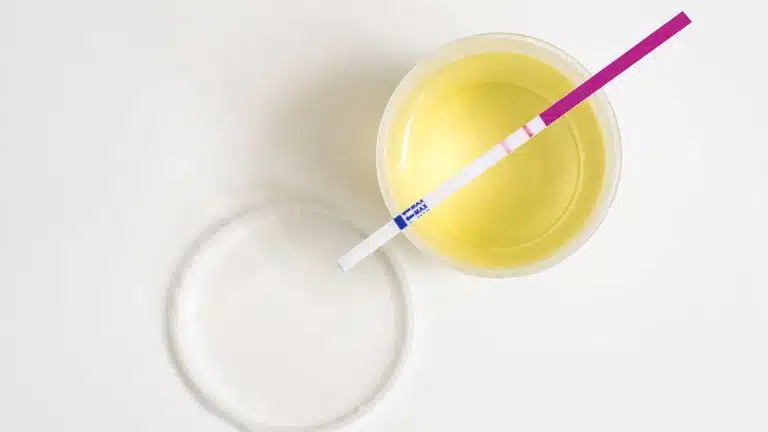Alcohol Urine Tests | How Long Does Alcohol Stay In Your Urine?
- Types Of Alcohol Urine Tests
- Why Are Alcohol Urine Tests Used?
- How Long Does Alcohol Stay In Your Urine?
- Interpreting EtG Test Results
- Limitations Of Alcohol Urine Tests

Alcohol urine tests are used to test whether someone has been drinking alcohol and how much they’ve been drinking. They’re considered more reliable than blood tests or breath tests/breathalyzers because alcohol urine tests can detect the byproducts of alcohol much longer.
Types Of Alcohol Urine Tests
There are two types of alcohol urine tests: alcohol in urine tests and EtG tests.
Alcohol In Urine Test
Alcohol in urine tests does exactly what it says it does. It tests for the presence of alcohol in your urine.
When someone drinks alcohol, some of it breaks down in the body and leaves through the breath, sweat, feces, and urine. The only weakness of this test is that it detects alcohol in the urine for only a short amount of time.
EtG Test
The second type of alcohol urine test is an EtG test. EtG stands for ethyl glucuronide, a byproduct or metabolite of alcohol/ethanol. Liver enzymes (alcohol dehydrogenase) break the alcohol down and it’s metabolized before it moves on to other parts of the body.
Since EtG remains in the body long after alcohol has left, it’s much better for testing whether someone has been drinking over other types of tests. EtG can be present in the urine 48-72 hours after someone’s last drink
Why Are Alcohol Urine Tests Used?
EtG tests are used to detect the presence of ethyl glucuronide in the urine. It can also screen for EtG in your blood, hair, and nails, but the urine test is the most widely used. The main purpose of an EtG test is to document whether someone’s drinking alcohol or not.
EtG and other alcohol urine tests may be used for:
- alcohol treatment programs/detox programs
- court cases (like child custody)
- DUI or DWI program
- liver transplant patients
- probation programs
- professional monitoring programs (like airline pilots or healthcare professionals)
- schools or the military
How Long Does Alcohol Stay In Your Urine?
Urine tests can detect very low levels of alcohol up to five days after consumption, and this is especially true with EtG tests. The only type of test that can detect alcohol longer is a hair test.
That being said, how long alcohol stays in the body and can be detected in your urine depends on a number of factors, including:
- gender
- body fat
- age: older people become intoxicated faster
- menstruation: women can become more intoxicated when drinking just before their period since hormones play a role in a person’s blood alcohol concentration (BAC)
- type of alcoholic beverage consumed
- amount of alcohol use ( a drink or two vs. binge drinking)
- individual alcohol tolerance
- alcohol metabolism: how quickly your body processes alcohol
- full or empty stomach
- overall health (physical and mental health)
- some existing health conditions: heart problems, type 2 diabetes, liver damage, and kidney problems
Interpreting EtG Test Results
If you’re tested using an EtG test, it’s important to know what your results may mean.
A high positive EtG test (>1,000ng/mL) may mean:
- excessive drinking on the testing day or the day before
- light-moderate drinking on the testing day
A low positive EtG test (500 to 1,000ng/mL) may mean:
- excessive drinking within the previous three days
- light alcohol consumption within the past day
- recent heavy exposure to environmental products containing alcohol within the last day
A very low positive EtG test (100 to 500 ng/mL) may mean:
- excessive drinking within the past three days
- light alcohol consumption within the past 12-36 hours
- recent exposure to environmental products containing alcohol
Limitations Of Alcohol Urine Tests
While alcohol urine tests have some great advantages, they do have some disadvantages and limitations as well. Some of the limitations include:
- not meant for people who can drink on their own time
- will not tell you whether alcohol is still present in breast milk
- false positives
When exposed to certain things, a false positive can be produced. Some of these products include:
- foods prepared with alcohol
- cleaning products
- breath sprays
- mouthwash
- cough syrup
- hand sanitizers
- hygiene products
- aftershave lotion
- cosmetics
- hair dye
If you or a loved one struggles with alcohol addiction, please call our helpline today.
Written by Ark Behavioral Health Editorial Team
©2024 Ark National Holdings, LLC. | All Rights Reserved.
This page does not provide medical advice.
Alcohol and Alcoholism - Ethyl Glucuronide: A Biomarker To Identify Alcohol Use By Health Professionals Recovering From Substance Use Disorders
Medical University of South Carolina - About Urine Ethylglucuronide (EtG) Testing
National Association of Drug Court Professionals - Alcohol Testing
National Library of Medicine - Detection times for urinary ethyl glucuronide and ethyl sulfate in heavy drinkers during alcohol detoxification
Questions About Treatment?
Ark Behavioral Health offers 100% confidential substance abuse assessment and treatment placement tailored to your individual needs. Achieve long-term recovery.
100% confidential. We respect your privacy.
Prefer Texting?
Our friendly support team is here to chat 24/7. Opt out any time.







 Learn More
Learn More








